
News + Trends
Money plays no part in these dream interiors
by Pia Seidel
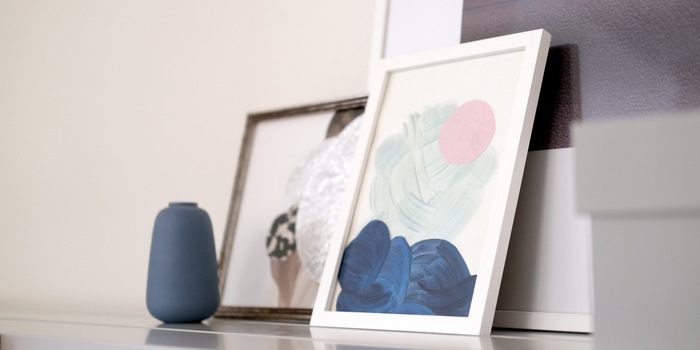
To create a new whole from pieces of paper, you don't need any prior knowledge, just a keen eye for the world around you and the courage to try out different methods.
Little things have always caught my eye. For example, some people love the content of a Kinder Surprise, while others love the container. Every time I received one, I read the tinfoil, which I kept preciously. Later, when I discovered the art of collage, I knew what I was going to do with them. These sheets of aluminium foil would become an integral part of my photo compositions.
Collages provide a stage for things that are often lost in another context. Most of the materials you need to create a collage are already all around you. With the exception of a few tools, you need method.
Susceptible of altering the scope of an image, the element removed by cropping leaves an empty space to be filled in or not. In my example, I'm trying to create the illusion of a reflection of flowers in the rear-view mirror instead of a street. It takes a certain amount of dexterity, but the desired deceptive effect is successful I think.
Try it yourself, for example, by making a cut-out in the upper part of the image. Place it, and the newly created space, on other photos. You can choose a pattern that preserves the illusion of three-dimensionality or test the opposite: for example, filling the gap with a flat, monochrome shape.
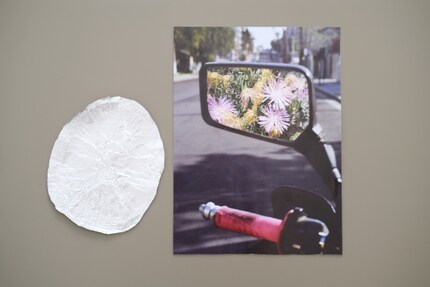
The tone and texture of some of the photos is appealing. Not only do the newspaper clippings captivate, but the packaging too. For my collage, I cut out elements whose patterns I like and use them like paint. Among them is also the tinfoil from the Kinder Surprise, which I place - like a splash of colour - on the photo to create an abstract composition.
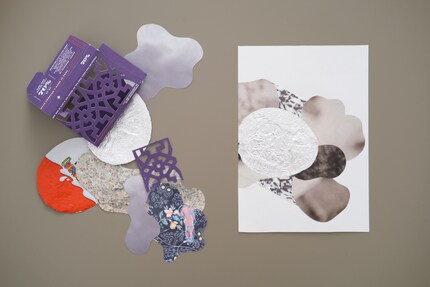
For this variation, before throwing away the packaging, it's best to take a good look, as even the smallest elements can add colour. When searching, take a look at the back of the packaging, which is often different from the front. For example, a milk carton has a different surface on the inside and outside.
Whether you crease the paper or make an origami figure out of it, a collage gains character from folding. I decide on a solid-coloured paper, which I crease first and then smooth again to then obtain shadows that appear different depending on the angle of view.
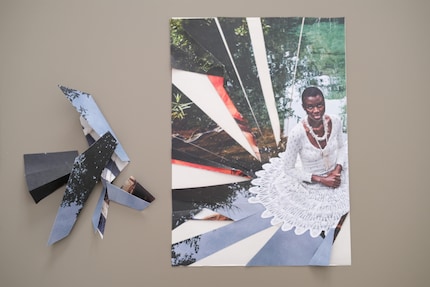
Test this technique by folding a blank sheet of paper into which you will later cut shapes to incorporate into your collage.
Or why not fold a photo with a pattern? Make a few cut-outs that you fold to manage to modify the "inside" of the photo. The great thing is that it creates new spaces that you can fill in differently.

A collage can be made up of text, coloured sheets of paper, photos or even self-made pieces using drawing and painting in particular. To create abstract shapes, you can paint different patterns on watercolour paper, which you then cut out to use as the basic elements for a collage.
If you can't find suitable patterns in magazines and the like, design your own in this way. Try out different backgrounds, brushes and pencils to create fragments that are as motley as possible.
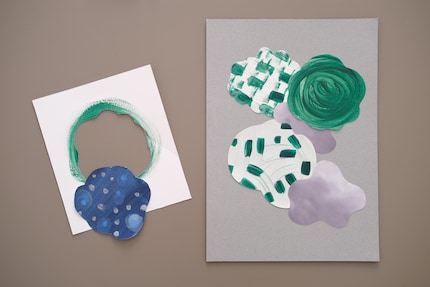
The way different elements are cut for a collage can become a personal style. I prefer soft, unobtrusive edges for my collages, for example, copying the silhouette of a woman's cut-out from a newspaper page. On grey paper, the outline, highlighted, gives an idea of what used to be done.
Discover what you love. Tearing out elements creates a kind of frame. On the other hand, cutters and scalpels encourage precision work.
Find out what you like.
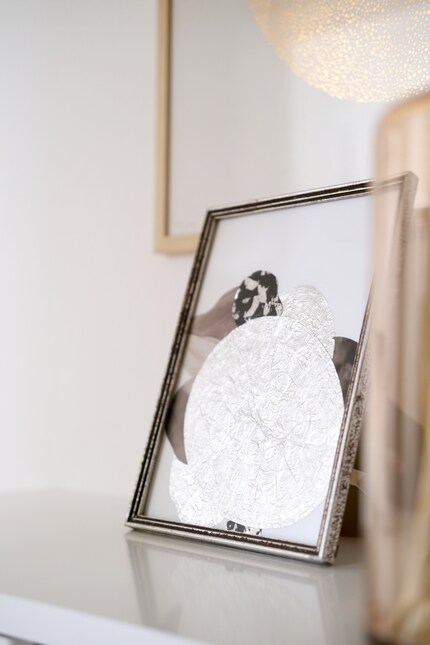
Whichever method I choose, the creative process can and should vary. Sometimes I make two collages at the same time, as several ideas come to mind while researching motifs. I feel like a museum curator collecting different works of art. As I glue the pieces of paper onto a support, I pay more attention to each element in the hope of getting the same from the viewer. After all, maybe someone will perceive the aestheticism of my Kinder Surprise wrapper, which they usually tear open before throwing away?

Still haven't got the motivation to make a collage? Enter this competition for a chance to win a voucher worth CHF 200 towards the collage interior of your dreams.
Like a cheerleader, I love celebrating good design and bringing you closer to everything furniture- and interior design- related. I regularly curate simple yet sophisticated interior ideas, report on trends and interview creative minds about their work.
Practical solutions for everyday problems with technology, household hacks and much more.
Show all